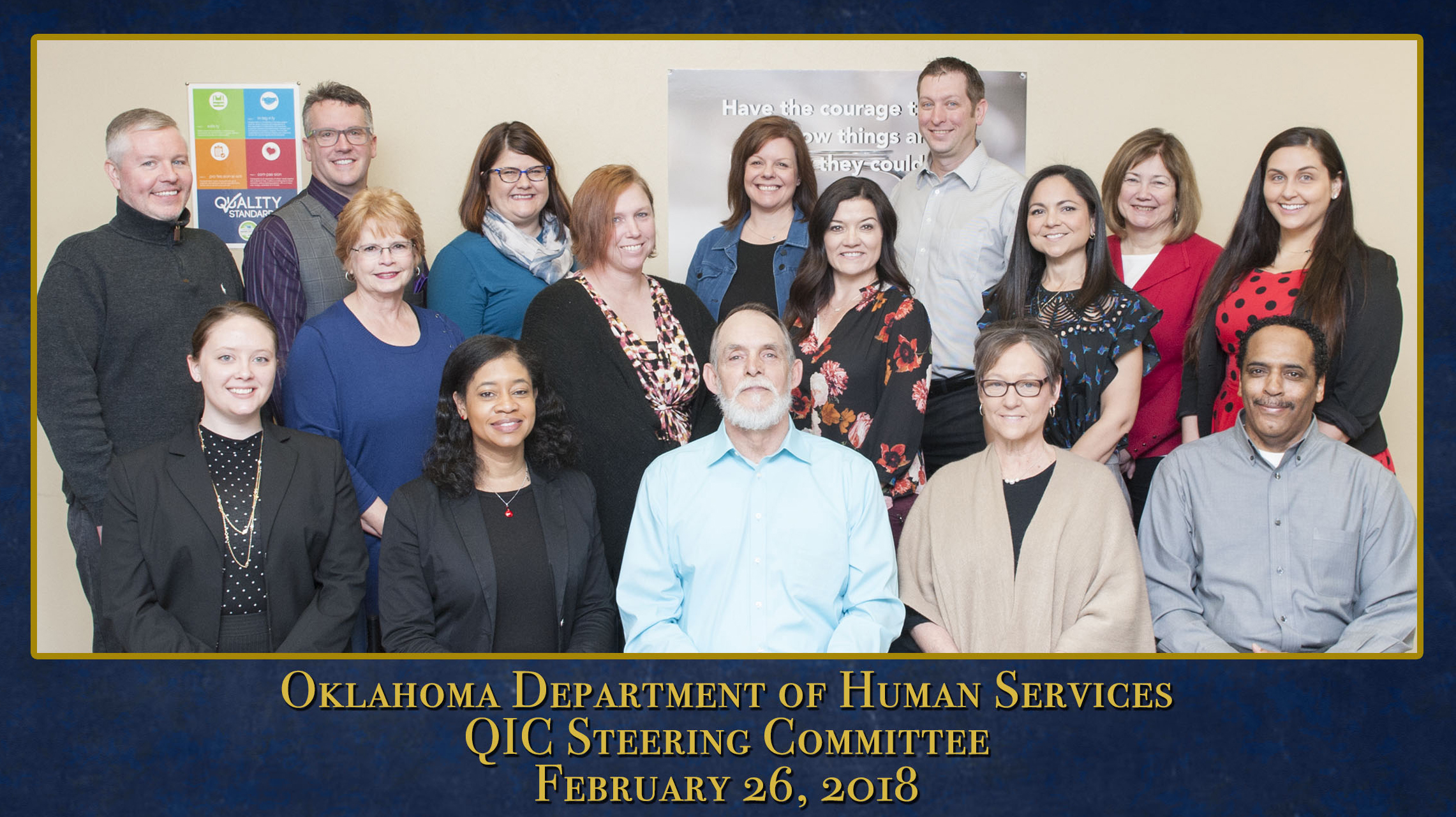Competency-based Personnel Selection
The Implementation Team
The QIC-WD worked with Oklahoma Human Services (OKDHS) Division of Child Welfare Services to establish a team to lead the development and implementation of their competency-based personnel selection intervention. The implementation team was called the Oklahoma QIC-WD Steering Committee. It included a Programs Analyst from each of the five geographic regions of the state and one from the Foster Care and Adoptions program, the Site Implementation Manager (SIM), the Data Coordinator, project sponsor (Deputy Director), representatives from Human Resources, training partners within OKDHS and from University of Oklahoma Center for Public Management, and three members of the QIC-WD (representing expertise in workforce, implementation, and evaluation). The SIM and Data Coordinator positions were partially funded by the QIC-WD, all other representatives participated as part of the “other duties, as assigned” aspect of their job.
 The Steering Committee met once every 1–2 months, face-to-face, for a full day in Norman, Oklahoma for the first two years of the project. The Steering Committee met as needed in 2020 and resumed monthly meetings in 2021. Meetings were held virtually when the agenda was short or due to the pandemic in 2020–2021. The meetings were led by the SIM. Additionally, between Steering Committee meetings, the QIC-WD representatives met with the SIM, Data Coordinator, and project sponsor virtually every 1–2 weeks throughout the project.
The Steering Committee met once every 1–2 months, face-to-face, for a full day in Norman, Oklahoma for the first two years of the project. The Steering Committee met as needed in 2020 and resumed monthly meetings in 2021. Meetings were held virtually when the agenda was short or due to the pandemic in 2020–2021. The meetings were led by the SIM. Additionally, between Steering Committee meetings, the QIC-WD representatives met with the SIM, Data Coordinator, and project sponsor virtually every 1–2 weeks throughout the project.
The Steering Committee was responsible for:
- Serving as project champions
- Communicating project updates to their region or program
- Reviewing and interpreting the needs assessment data
- Selecting and developing an intervention
- Determining fit of intervention with agency priorities
- Considering how the intervention would integrate into existing systems and agency structures
- Considering if any agency policies or procedures impact the intervention
- Planning for implementation
- Monitoring fidelity to inform the delivery and ongoing sustainability of the intervention
- Planning for sustainability
The implementation team was guided by a charter that detailed the role of team members, the process for decision making, the frequency of meetings, etc. Input from individuals outside of the Steering Committee (e.g., staff, supervisors) was solicited through workgroups and focus groups as needed to inform development of the intervention and throughout the project.
Preparing for implementation
The Steering Committee engaged in a series of activities to help the agency prepare for the implementation and evaluation of the intervention. They delivered kick-off presentations to the OKDHS leadership team, district directors, and field managers. The Steering Committee routinely discussed potential barriers to successful implementation and brainstormed solutions and engaged in ongoing communications with agency leadership and colleagues in each region through staff meetings.
Implementation Supports
Implementation supports were primarily used to support fidelity to the standardized hiring process and inform the Steering Committee of implementation successes and challenges that could be celebrated or remedied. Key implementation supports included the following tools and processes for teams involved in the intervention:
Standardized Hiring Process Guide
A Standardized Hiring Process Guide provided detailed step-by-step instructions regarding every step of the process, including selecting hiring panel members, scheduling and invitations, materials and file preparation, administering the typing and writing assessments, conducting the interview, calculating candidates’ scores, hiring decisions, and documentation requirements. When relevant, screenshots of several software applications were provided for visual support.
Training
Training on the process was provided to Administrative Assistants (AAs) and hiring panel members. AAs received a two-hour webinar training that included instruction and discussion. During initial implementation, hiring panel training was a one-day, in-person training that involved instruction, discussion, and rating practice with videos of simulated interviews. When virtual hiring was initiated, both trainings were revised to include new processes, and the in-person hiring panel training was converted to a one-hour self-paced online training and a four-hour webinar training. Refresher trainings were also offered after the process was temporarily suspended due to COVID.
Videos
For AA duties, portions of their training were converted to short instructional videos for just-in-time support.
Rating Guide
For hiring panel members, a rating guide was developed for use during the interview, rating, and discussion process. It included guidance on opening and closing the interview, suggested probing questions, and behaviorally anchored rating scales for each competency in the interview and the writing assessment.
Participant Feedback
AAs and hiring panel members participated in focus groups and gave feedback to inform changes to the training, support materials, and the process. Programs Analysts, who work closely with staff and supervisors, also served as liaisons and funneled concerns and questions from field.
Observation and Reviews
Programs Analysts observed a sampling of interviews to assess implementation and provide feedback to panels about fidelity. In addition, hiring documentation was reviewed, and participants received tailored feedback on how to improve implementation fidelity.
Coaching and Technical Support
Coaching and technical support were available for AAs and hiring panel members from QIC-WD and HR, as needed. Questions could be submitted via a dedicated project email address.